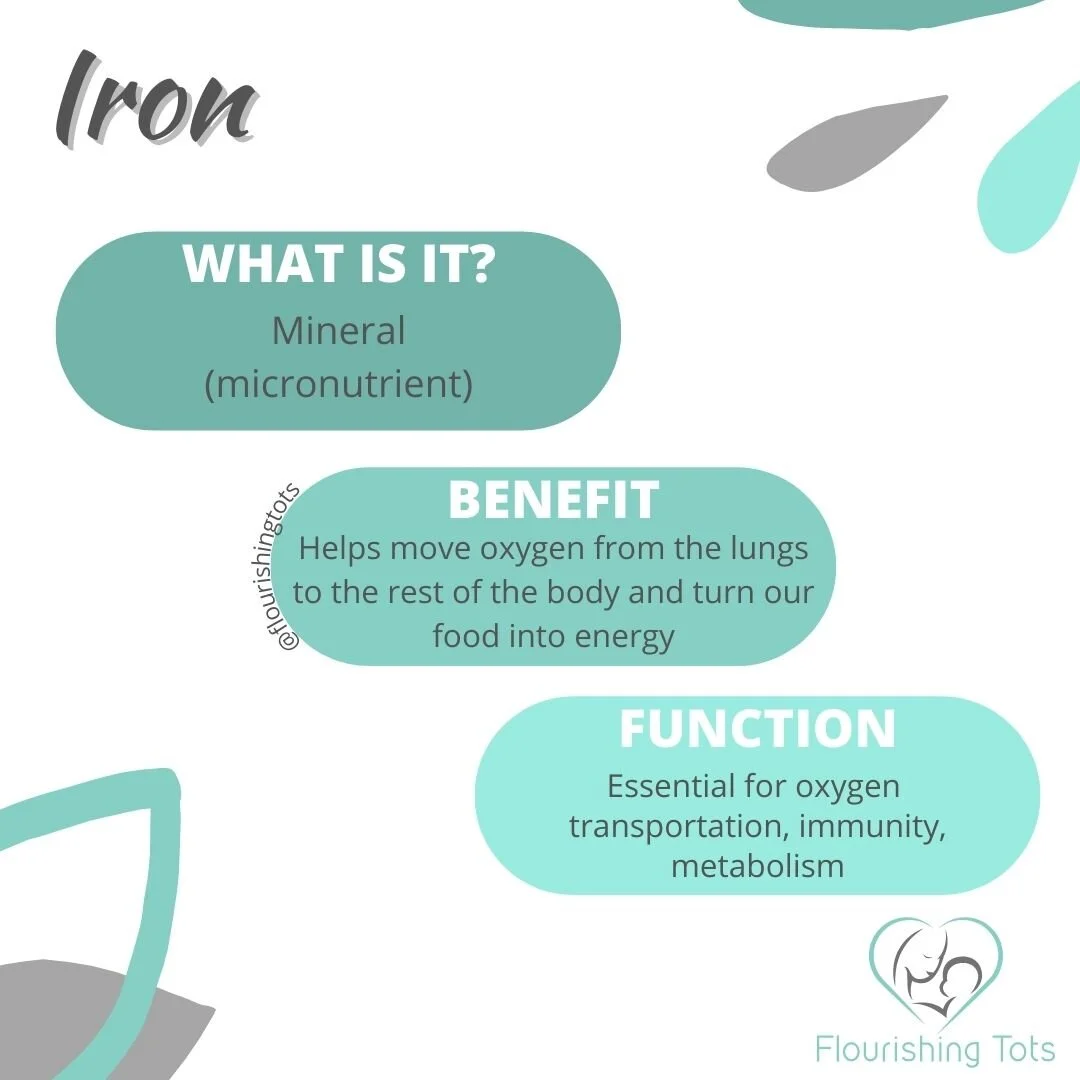Iron
Lactation Celebration Month and World Breastfeeding Week part 2…iron. I’m feelin’ sassy so there may be some loose terminology in here. I got a little nerdy here too so put on your thinking cap and jump in!
WHAT IS IT?
Iron is a mineral required for humans (and all other living things) to survive.
WHY IS IT GOOD FOR HUMANS?
Oxygen. That’s why. ;)
Iron is needed to create the heme portion of hemoglobin. Hemoglobin lives in red blood cells. It picks up oxygen (O2) and, with the help of red blood cells and your blood circulation, transports O2 around the body.
Iron also helps us fight germs by helping immune cells mature and multiply.
As if that wasn’t enough, iron helps your brain cells work faster…or rather, a lack of iron prevents your brain from operating at full speed.
IS IT AVAILABLE from sources other than human milk?
Most def. There are 2 types of iron. Heme iron and non-heme iron are available from animal meat. Plants contain only non-heme iron. Iron fortified foods (cereals and such), as well as animal products like eggs and milk, also contain non-heme iron.
Non-meat eaters may need to be more mindful of their iron intake than meat eaters. Here’s a nice list of iron rich foods from some lovely dietitians in British Columbia…pork liver anyone? Hot tip: eating vitamin C rich foods with iron containing foods helps your body absorb the iron better.
Infant formula has iron added to it because we get all the iron we need from what we eat. Humans cannot create their own iron.
Lots of people take iron supplements due to having low iron, which is determined by a blood test. It’s important to consult with your healthcare provider before starting supplements to see if they’re right for you.
Do babies need supplemental iron?
Meh. Healthy babies born within 2 weeks of their due date (term) and who had their umbilical cord cut after it stopped pulsing (delayed cord clamping) probably don’t need extra iron for the first 6 months of life. Around 6 mo you can introduce foods high in iron (and I don’t mean rice cereal…yuck).
Why do babies need delayed cord clamping (DCC)?* In order to get their full blood volume at birth. The placenta holds about 1/3 of the baby’s blood volume at any given time. If the cord is cut as soon as the kid pops out, 1/3 of their blood, 60% of their RBCs, and 40-50mg per kg of iron gets left behind. For a 7.5 lb baby that’s about 150mg of iron…and a lot of O2 carrying capacity! They need that blood to get their full iron stores and help them transition from scuba diving to air breathing. The benefits of DCC may be beneficial for years.
Preterm babies may need supplemental iron prior to 6 mo of age because iron stores really start to build in the last trimester of pregnancy.
Back to iron…
Iron is not abundant in human milk…but don’t worry! It’s ok. Our bodies do such a good job making milk for our very own species that it’s absorbed very well…50-70%! Comparatively, only 3-10% of cow’s milk based infant formula is absorbed.
Kelly Mom explains iron supplements well:
“The introduction of iron supplements and iron-fortified foods, particularly during the first six months, reduces the efficiency of baby’s iron absorption. As long as your baby is exclusively breastfed (and receiving no iron supplements or iron-fortified foods), the specialized proteins in breastmilk ensure that baby gets the available iron (instead of “bad” bacteria and such).”
If you were told to give your baby iron supplements because they’re a baby, ask more questions. Most exclusively breastfed babies don’t need extra iron.
Can high iron levels be bad for you?
Yes. Extra iron gives bacteria and viruses more food. They need iron in order to spread and contaminate us, so having more iron than your body needs isn’t great. For a smidge more info on that, see my post about how iron and lactoferrin work together.
Too much iron (typically from supplements) can be toxic in some people, usually in relation to rare genetic mutations. If you are taking an iron supplement, make sure you consult with your healthcare provider.
WHAT IF HUMANS DON’T GET ENOUGH OF IT?
Iron deficiency anemia can develop if someone doesn’t eat enough iron or if the iron they are eating isn’t well absorbed. Anemia is rare in babies term babies who received their full blood volume from the placenta at birth and are exclusively breastfed or are eating formula with added iron.
With babies, a lack of iron inhibits optimal brain growth. Iron is essential to developing myelin and connecting brain signals. Developmental delays can occur if there is not enough iron present during the first few years of life. Babies use about 60% of their body oxygen in their brain, compared to about 20% in adults.
Parental iron supplements have not been shown to increase levels in breast milk. Bodies just do a damn good job putting in the right amount of iron!
Resources:
Critical Care, Kelly Mom, UCSF Health, E Life Sciences, NIH
* “Delayed” cord clamping is a misnomer. The previous norm in hospitals was to cut the cord as soon as the baby was born so the term “delayed” meant “not immediately”. A better name is “physiologic cord clamping”, referring to after the cord stops pulsing (aka when it’s no longer doing it’s job).
The World Health Organization recommends clamping no sooner than 1 min for all babies. This practice is increasing around the world. If you’re pregnant, I would definitely do some research around this. There are even hospitals that, if a baby requires resuscitation after birth, will bring all the equipment to the baby so they can remain attached to the parent, rather than bring the baby to the equipment.

